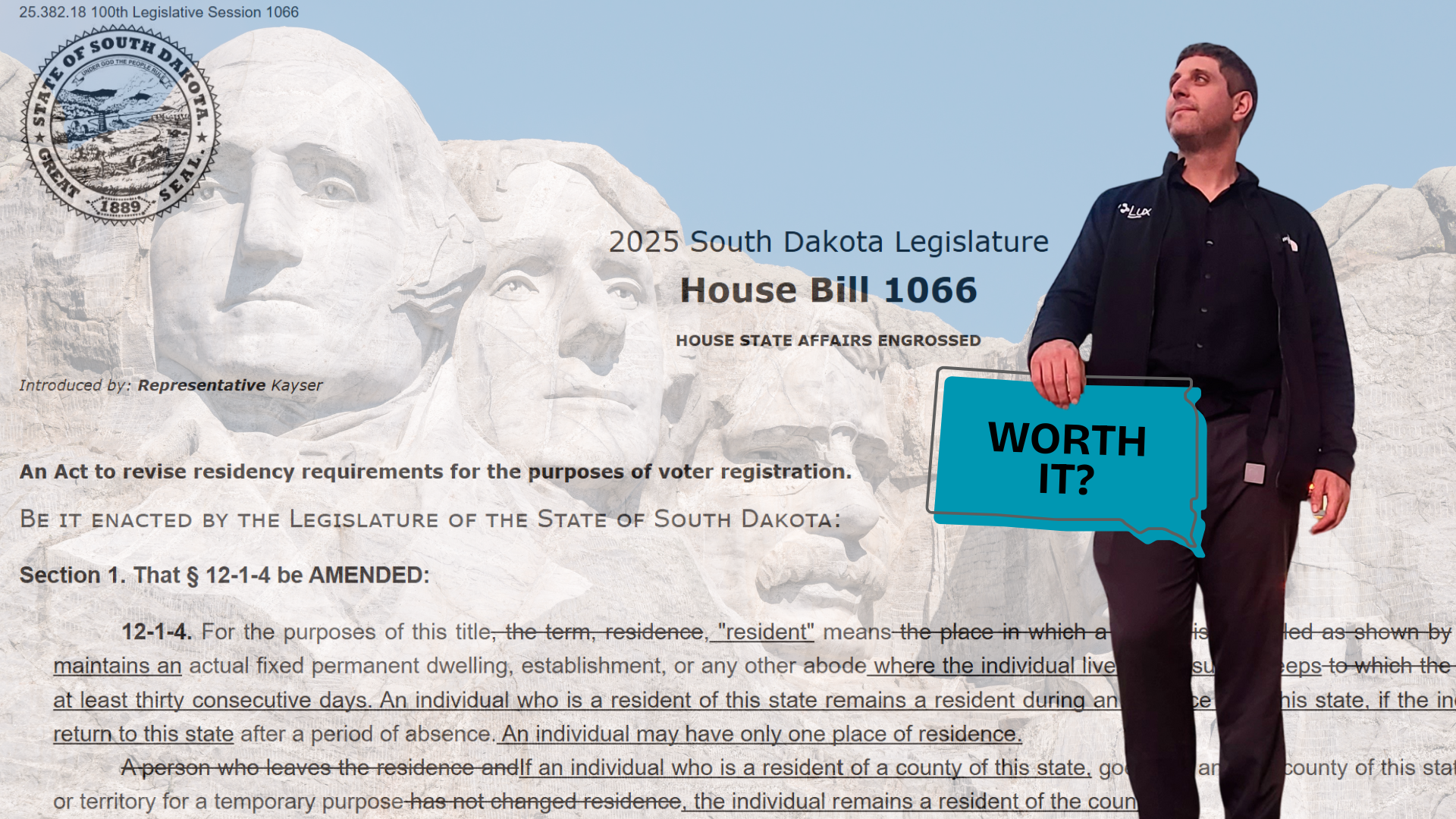Nomads: Know this BEFORE you apply for South Dakota Residency

When we travel the country, we always face the inevitable question, "Where are you from?" We started off joking that we're from "Nowhere and everywhere at the same time." After all, home is where we park it in our RV. But most of the time, we keep things simple and say "Massachusetts," because that is where we lived before we launched full-time, and it's where we have a home-base.
When we say keep things simple, this is a necessity because where we're from gets even more complicated. We now own land in New Hampshire, making it the only state where we actually own property. I could also say I'm from South Dakota, because legally, and according to our truck and trailer license plates, it's true! It's only a legality, though, because I decided to become a South Dakota resident in 2023. Even more complicated is that, while I made the switch, Nicole didn't. So we often joke with people that we're in a long-distance relationship, despite living less than 250ft apart.
South Dakota makes it very easy to qualify for residency as a nomad, and financially, changing my state of residence from MA to SD was a no-brainer. Nicole stayed put in MA because she owns a business, but I was working full-time for a company that had all remote workers. All I needed to do to qualify for SD residency was spend 1 night in the state and prove that I didn't own a home or commercial property in any other state. I needed to have a local personal mailbox, or PMB, which is a forwarding address. Lastly, I needed to sign a affidavit of intent to return to the state.
Looking back, was changing my residency the right decision? I made the switch in late summer 2023, and we didn't know that we'd be buying land in NH just over a year later. Since we only have a land lot and don't have a residential address yet, I've been able to keep my SD residency for this past year, but I will need to switch over to NH as soon as we begin our cabin build. Was it worth going through my residency change just for a few years? After all, many nomads make this move because they see full-time RVing as a long-term lifestyle, not just something to do for a few years.
Becoming a SD resident was primarily a financial move, and it has paid off tremendously over the past couple of years. Taxes are much lower in SD than MA, plus many of the associated legal processes, like vehicle inspections and driver's license renewal, are much less of a hassle (or in the case of vehicle inspections, not required at all). This makes the switch seem like a no-brainer, but things are a bit more complicated than that.
In 2023, as I was preparing to make my residency change, there was already a major, ongoing debate in the RV community. A controversial new law was about to be put on the ballot for the year's election, causing many RVers to caution full-timers against applying for residency in the state. The law, SD House Bill 1066, stated that full-time travelers with SD residency would not be eligible to vote in state elections unless they spend 30 consecutive days in the state, at their permanent address. Mail forwarding addresses do not count as permanent addresses.
As a result, the RV community went up in arms, discussing that this law was essentially complete disenfranchisement, and that nomads would be better off changing residency to other traveler-friendly states like Texas or Florida, should the law be voted into effect. To make matters worse, more laws then got introduced, further stipulating that nomads with domiciles – a legally required place of residence – could not register to vote from a business address, including a campground. House Bill 1232 and Senate Bill 124 had language that specifically cracked down on full-time campers' rights to vote.
It's important to note that this is specifically for state elections, not federal. Oftentimes, when bad news spreads like wildfire, people will extrapolate on the tidbits of information they hear, and suddenly RVers are exclaiming "Don't domicile in SD! You won't be able to vote!" However, residents would still be allowed to use mail forwarding addresses for federal elections. As for state elections, this begs the question: Should we be allowed to vote anyway? I don't have ties to the state. Who am I to have a say in who represents Box Elder, SD in the state legislature, or is on the Pennington County board of commissioners? I don't know the elected officials and most of the state's laws won't impact me in a meaningful way. So should we just accept the ease and lower cost of residency and let the election stuff go?
As someone who is traveling to escape political ideologies, this was where I leaned. However, RV Miles often covered this topic in their RV news roundups, and Jason asked the important question: If not in SD, then where could nomads vote? This question shed light on the RV community's fear of disenfranchisement. Where do we belong? We could take this a step further and note the irony of state bills telling us nomads what we can and cannot do. The state's permanent residents will vote for us to not be able to vote, which means in the future, if another bill is introduced that impacts nomads, we won't be able to vote on it. Got it.
All that to say, I moved forward with changing my residency, because saving money was more important than having a say in state elections. Because I was already a resident and therefore could not be stripped of my residency, some of the bills' stipulations didn't apply to me anyway. House Bill 1066 passed, but all the others related to nomad domiciles did not. For a nomad who wants to vote in state elections, this isn't ideal, but it might open up a loophole for those who live seasonally or stationary at a campground. This is up to the powers that be.
As for me, I went on with my full-time RV life, enjoying all the benefits of working my remote job while I traveled. I barely paid any mind to the politics in my state of residency. That is, until my job and the politics collided, and I was forced to pay attention.
At the end of July, I lost my job in a round of layoffs. I discussed more of that story in our recent member’s only livestream, but this isn't about losing my job as much as it's about a big problem I faced as a result of the job loss. Back in February of this year, my employer got an email from the Pennington County Treasurer’s Office. They were conducting audits and found that my employer was paying my federal unemployment insurance taxes incorrectly. I was tasked with figuring out how to resolve this, and after some research and some back-and-forth with both the county government and ADP (who handles payroll for the company), I thought we had figured it out.
In late 2023 after I changed my residency, another law affecting nomads came to light, but this time, it wasn't a law change that would make it to the state or RV news channels. It was a new enforcement of SD Codified Laws 61-1, stating that full-time travelers working remotely for out-of-state employers were no longer eligible to pay federal unemployment insurance taxes based on their PMB address. Instead, that specific tax must be paid based on “where the work was performed.”
Besides being a quiet change, this rule likely wasn’t discussed because it only affects a small number of people, like myself: a full-time remote worker who loses his job. Retirees, travelers who perform in-person work, or people who remote work but don't lose their jobs while traveling, are all completely unaffected.
When I dug into this, I got nervous. Some articles claimed that travelers would now have to get their employers to pay taxes differently every time they crossed state boundaries, which is obviously just not possible. I got in touch with the Treasurer’s office and found out that this wasn’t necessary, and my PMB was still valid for state income, federal income, and FICA taxes, as well as vehicle registration fees. It was just not valid for unemployment insurance. I asked what that meant in practice, and they said that my employer should pay that specific tax, and no other, based on the employer’s address rather than my own. In my case, that would have been in California. I told my employer this, who said they would work it out with ADP. Then I waited.
Unfortunately, this rule is so specific to the way SD handles nomads, that the rest of the country is not on board. ADP, my employer, and a small number of articles that talked about this online, all agree that no other state allows this kind of separation of income and unemployment tax locations. ADP didn’t know how to file taxes according to this separation, and so my employer kept paying my unemployment insurance tax to a state that refused to accept it. This meant that, when came time to cash in on my unemployment, the state of California had no idea I existed. If I told them, and tried to file for unemployment benefits there, they’d try to charge me for 2 years of back taxes. It's no secret that CA taxes are exorbitant, so this would not make sense for me. The rates would have been higher than what I would have been paying in MA, let alone SD. It also would have been much more than I'd get from my full 6 months of unemployment benefits, anyway. I had no choice but to take the loss. The only silver lining is that I did save a lot more in taxes by becoming a SD resident than it cost me in benefits. Changing to a SD domicile was worth it, and I’d do it again.
However, my situation was a huge wakeup call, that there are likely little legalities written for (or against) nomads, that could cause real issues when we least expect them. I haven’t looked in detail at other states’ laws, but at first glance, it looks like this ineligibility for unemployment benefits is also true for the other popular states nomads choose for establishing residency. If you’re a working full-time traveler considering changing your domicile for legal purposes, keep this in mind. Do your due diligence and calculate the cost versus benefit for your specific situation, especially in case of job loss while on the road.

